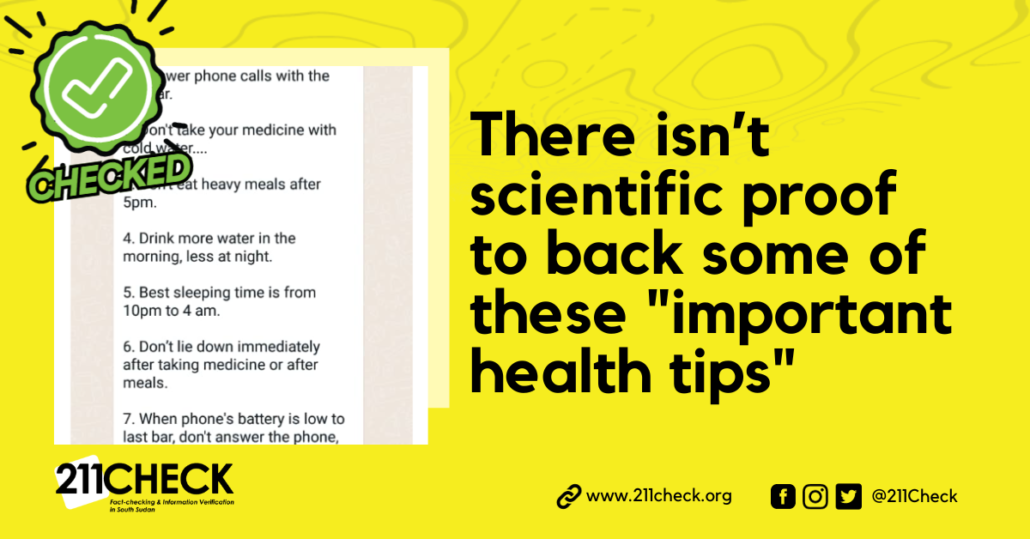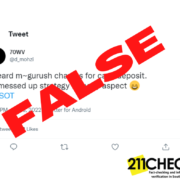Fact-check: Some of these WhatsApp chain health tips aren’t scientifically proven
There isn’t scientific proof to back some of these “important health tips”.
Writer: Beatrice Amude Paulino
A WhatsApp message circulating in groups and claiming to offer important health tips, such as answering phone calls with the left ear instead of the right one, is misleading.
According to the message, people should adhere to the following:
-Answer phone calls with the left ear
-Do not eat heavy meals after 5 p.m.
-Drink more water in the morning and less at night
-The best sleeping time is from 10 p.m. to 4 a.m.
-Do not lie down immediately after taking medicine or after meals.
-When the phone’s battery is low to the last bar, do not answer the phone because the radiation is 1000 times stronger.
The WhatsApp message reiterates that people should forward the message to loved ones because “Kindness costs nothing, but knowledge is power.”
Screenshot from the WhatsApp message
The message has seemingly been circulating for a while and was also shared on Quora in 2015, on Facebook on March 11, 2017, and then on June 23, 2020 here.
Claims Verification:
Claim 1: Answering phone calls with the left ear.
No scientific evidence suggests that using your left ear while talking on cell phones is better than using your right ear.
In a 2014 factsheet, the World Health Organization (WHO) found that “a large number of studies have been performed over the last two decades to assess whether mobile phones can have potential health risks, but no adverse health effects have been established as being caused by mobile phone use.’
In addition, Africa Check fact-checked this claim and found it to be incorrect.
Claim 2: Do not take medicine with cold water
The same claim has also been posted here. It says cold water reduces digestion and, as a result, makes the effect of the medicine take longer.
According to the findings by 211 Check, this claim is true: Future of Nursing (Nurselk), cold water will reduce digestion, and the medicine will take more time to act.
Claim 3: Do not eat heavy meals after 5 p.m.
This claim is highly controversial as food consumption habits impact different people in varied ways depending on factors such as health conditions. In some cases, heavy meals closer to bedtime reduce the body’s rate of metabolism, while in other cases, depending on the nutrition and fitness goals, it could be beneficial.
According to the Family Doctors Organization, during the eating window (time allowed for eating), the focus should be on eating a healthy diet and maintaining portion control.
Claim 4: Drink more water in the morning and less at night:
Healthline, a medically reviewed website, noted that as long as one can compensate for the body’s water loss, it doesn’t make much of a difference whether you start your day off with a glass of water or drink it at any other time of day.
Similarly, according to clevelandclinic.org water is essential to keep your body hydrated and joints lubricated, break down waste, and much more, but there isn’t an ideal time for your water intake unless it frequently interrupts your sleep if you consume more water close to bedtime.
Various medical sites, here, here and here, also advise that thirst alone should be enough to guide most people on how much to drink, and not necessarily the time of water consumption.
Claim 5: The best sleeping time is from 10 pm to 4 am.
According to VeryWell Health, ‘The amount of sleep you need each night changes over the course of your life. Therefore, your age can help you figure out what time you should go to bed to feel refreshed and able to function optimally during the day.’
Additionally, according to Dr. Colleen G. Lance, a physician in the Sleep Disorders Centre at the Neurological Institute at Cleveland Clinic, “there’s not a magic number that someone has to adhere to. It has to do with what your personal need is, and everyone has a different need.’’
So, while 10 p.m. may be ideal for others, instead of focusing on the digits on your alarm clock, Dr Lance says consistency should be your goal.
Other sources found here, here, and here also support the sentiment that it is better to be consistent with going to bed and waking up at a certain time for better sleep quality.
Claim 6: Do not lie down immediately after taking medicine or after meals.
Johns Hopkins Medicine published an article with the headline Medicines and the Digestive System,where they explain many good practices for taking medicine and some dangers that taking medicine can have. They particularly explain that people should not take medicine and lie down immediately when the tablets are still in the oesophagus to avoid heartburn.
Claim 7: When the phone’s battery is low to the last bar, do not answer the phone because the radiation is 1000 times stronger.
211 Check has found out that mobile phones communicate by sending radio waves through a network of antennas. The US National Cancer Institute says they emit radiation in the radiofrequency region of the electromagnetic spectrum, but the frequency and energy are considered ‘too low to damage DNA’. It also adds that ‘there are no other clearly established dangerous health effects on the human body from radiofrequency radiation.’
Further, the World Health Organization says there are no known adverse health effects associated with low-level, long-term exposure to radiofrequency or power frequency fields.
In addition, this particular claim has been fact-checked by AAP Fact-check, Australia and found to be false.
211 Check also reached out to Dr. Francis Geri, the Executive Director of Vital Care Medical and an Obstetrician and a Gynaecologist at the Juba Teaching Hospital who corroborated the evidence above: “Most of the health claims are scientifically unproven, but number 2 and 6 are true. Typically, taking medicine with very cold water can affect how the medicine works and laying down immediately after taking medicine may cause heartburn or may cause the patient to vomit.’’
Conclusion:
211 Check finds that four claims listed in a WhatsApp message “Important Health Tips” scientifically unproven; however, two of the claims number 2 and 6 are found to be true. The claim is a long-running social media hoax spreading misinformation.
To ensure accuracy and transparency, we at 211 Check welcome corrections from our readers. If you spot an error in this article, please request a correction using this form. Our team will review your request and make the necessary corrections immediately, if any.It’s vital to fight misinformation and disinformation in the media by avoiding fake news. Don’t share content you’re uncertain about. False information can harm and mislead people, risking their lives—Fact-check before sharing. For more details, visit https://211check.org/ or message us on WhatsApp at +211 917 298 255. #FactsMatter.










Leave a Reply
Want to join the discussion?Feel free to contribute!